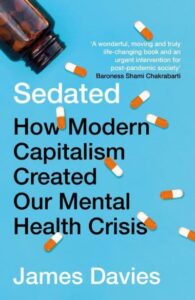Book Review by Laura Grace Simpkins
James Davies. Atlantic Books, 2021. 9781786499875.
 More than 20 per cent of adults take a psychiatric drug each year in Britain alone–over a 500 per cent increase since 1980. Despite this ‘prescription epidemic’, the prevalence of mental illnesses, from the least to most severe, has simultaneously risen. Many of us will be familiar with the statistics often quoted by organisations such as Mind, like ‘1 in 4 people are diagnosed with a mental illness of some kind in England each year’ and ‘the overall number of people reporting mental health problems have been going up.’[1] When pointed out, this does appear to be a contradiction, for which there are two possible explanations. The first is that we are indeed in the midst of what some have labelled a mental health ‘crisis’. The second is that the problem (and thus the solutions to the problem) have actually been misinterpreted.
More than 20 per cent of adults take a psychiatric drug each year in Britain alone–over a 500 per cent increase since 1980. Despite this ‘prescription epidemic’, the prevalence of mental illnesses, from the least to most severe, has simultaneously risen. Many of us will be familiar with the statistics often quoted by organisations such as Mind, like ‘1 in 4 people are diagnosed with a mental illness of some kind in England each year’ and ‘the overall number of people reporting mental health problems have been going up.’[1] When pointed out, this does appear to be a contradiction, for which there are two possible explanations. The first is that we are indeed in the midst of what some have labelled a mental health ‘crisis’. The second is that the problem (and thus the solutions to the problem) have actually been misinterpreted.
James Davies is a reader of medical anthropology and mental health at the University of Roehampton. He is also a qualified psychotherapist and had a stint volunteering for the NHS. His previous book is Cracked: Why Psychiatry is Doing More Harm Than Good, which investigates the ‘unholy alliance between drug companies and establishment psychiatry’ (12). Sedated can be considered as a sort of sequel to Cracked, with Davies turning his attention to psychiatrists’ treatment of choice: medications, specifically antidepressants. In Sedated, Davies shows that the so-called mental health crisis stems from the assumption that mental illnesses arise within the ‘broken brain’ of an individual sufferer. This is the ‘biochemical model’ of mental illness. In contrast to what many of us assume, the idea that mental illnesses are caused by an imbalance of neurochemicals and can only be treated by using psychotropics like antidepressants, or mood stabilisers or antipsychotics, is a theory that has never been proven. Neither depression nor schizophrenia, neither anxiety nor bipolar disorder, have ever been observed in vivo. No one has ever been able to point to an MRI or CT scan and say, ‘Look! There is it!’
According to Davies, this is because the biochemical model of mental illness is wrong. He argues that many diagnosed conditions (though in his book he sticks to the example of depression), are not down to malfunctioning grey matter, but are, instead, an understandable reaction to wider societal problems. In Sedated, Davies painstakingly debunks the individual, brain-based view of mental illness and explains why its apparently unquestioned acceptance by the general public as the only means of conceiving human distress should concern us. Not only does our taking this model for granted encourage the administration of potent drugs to those who don’t necessarily need them, it also results in the obfuscation of other plausible sources of hardship such as poverty, discrimination, loneliness, and environmental factors such as pollution. These are undoubtedly complex and more challenging to tackle than the comparably simple option of taking a pill every day. Pharmaceutical companies created the narrative of the broken brain to profit from them, and most governments of industrialised countries went along with it.
This wider discussion about how business, economics, and politics shaped psychiatry and vice versa is central to the main thrust of Sedated. Through the course of the book, Davies plots developments in psychiatry against those in the UK’s social, political, and economic spheres in order to demonstrate how the neoliberal, uber self-reliant free-market nurtured by Margaret Thatcher’s government of the 1980s has shaped how we understand mental wellness and illness, as well as ourselves, right up to the present day: ‘By putting economic servitude before real individual health and flourishing, our priorities have become dramatically and dangerously misplaced, and more suffering, paradoxically, has been the unhappy result’ (3-4). A key takeaway from this well-evidenced historical analysis is that the issues with our mental health system are deeply entrenched; simply throwing more money at the situation, by funding more facilities and professionals, will merely perpetuate the same ‘failing approach’ (324).
Sedated, read either before or after Cracked, serves as an excellent entry point into the area of research known as critical psychiatry. Davies’ overarching argument isn’t new exactly, there are countless other books that question psychiatry, the biochemical model, and our reliance on medications, but they are often sadly inaccessible (either through their writing style or because they are literally housed in specialist libraries) to the average reader. This book is written clearly and concisely, without beingpatronising or watering anything down. Such a welcome departure from what I’ve come to expect from the genre means that Sedated will be able to reach and be read by those who need it most: all of us.
Works Cited
[1] ‘Mental health facts and statistics’, Mind, https://www.mind.org.uk/information-support/ types-of-mental-health-problems/statistics-and-facts-about-mental-health/how-common-are-mental-health-problems/#AreMentalHealthProblemsIncreasing (accessed 28 January 2023).